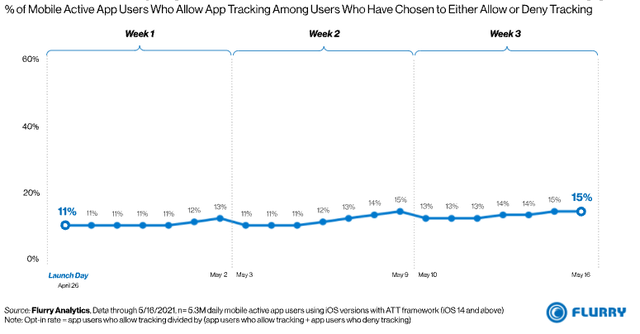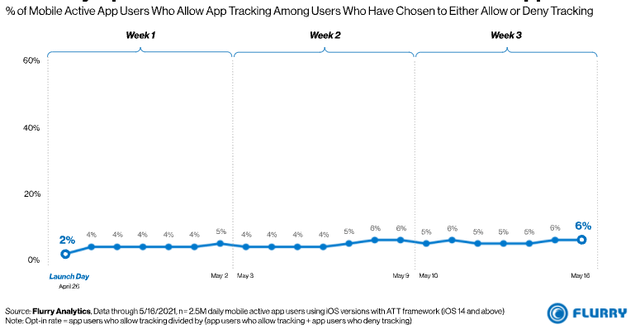
Justin Sullivan/Getty Images News
This article was prepared by Ubaidulla Sathar, CFA in collaboration with Dilantha De Silva.
Meta Platforms, Inc. (NASDAQ:FB) stock has witnessed significant selling pressure this year, which has pushed the stock down more than 40% YTD. In addition to the macro-economic uncertainty, Meta investors have also been facing idiosyncratic risk with regards to the business model of the company, primarily due to the privacy features introduced by Apple, Inc. (NASDAQ:AAPL) that limit data collection by third parties such as Facebook. The day after announcing its Q4 2021 earnings, the market value of the company plummeted by $230 million, which was the highest ever one-day loss for a company listed in the United States. Adding salt to the wound, Alphabet Inc. (NASDAQ:GOOG) announced on February 16 the launch of a “multi-year initiative to build the Privacy Sandbox on Android” with a goal to limit the sharing of user data with third parties. In this analysis, we will discuss the impact of these privacy features on Meta’s future earnings. We will not limit our analysis to the popular data points available widely, but will also present some interesting facts about the real-world effectiveness of Apple’s privacy features to get a clearer picture of Meta’s future.
Data fuels Meta’s growth
Reviewing the business model of Meta Platforms is important in identifying privacy concerns faced by the company. Meta Platforms generates revenue primarily through Ad revenue which made up 97.5% of the company’s total revenue in 2021. Advertising revenue is generated by displaying ad products on Facebook, Instagram, Messenger, and third-party affiliated websites or mobile applications. Marketers pay for ad products either directly or through their relationships with advertising agencies or resellers, based on the number of impressions delivered or the number of actions – such as clicks – taken by users. Meta Platforms has more than three billion monthly active users, and this makes the company an ideal platform for advertisers to market their products. In addition to this gigantic userbase, the vast amount of data held by the company makes it easier for advertisers to earn higher ROI on their marketing spend. For Meta Platforms to thrive, the company needs access to consumers’ data as the availability of data on purchasing habits and personal preferences is what makes Facebook and Instagram ideal platforms for companies to target their potential customers.
The expected negative impact through the lens of insiders
When Apple announced its new privacy feature, App Tracking Transparency, as part of the iOS 14.5 update in April 2021, Apple gave its users the choice to either “Ask App not to Track” or “Allow” a specific app to track their activity across other companies’ apps and websites. This effectively ended the previous process where apps and web platforms had the complete luxury of collecting data without the permission of users. In the first couple of months since the launch of Apple’s new privacy features, iPhone users across the world denied many third-party apps from tracking their data. This trend, understandably, was stronger in the United States.
Exhibit 1: Worldwide daily opt-in rate after iOS 14.5 launch across all apps

Flurry
Source: Flurry
Exhibit 2: U.S. daily opt-in rate after iOS 14.5 launch across all apps

Flurry
The financial implication of this trend was discussed in the recent earnings call when the company CFO said the expected impact on the topline for FY 2022 is around $10 billion. Based on the company’s 2021 revenue of $117.9 billion, we are looking at a hit of around 8.5%. To quote the CFO:
We believe the impact of iOS overall as a headwind on our business in 2022 is on the order of $10 billion, so it’s a pretty significant headwind for our business. And we’re seeing that impact in a number of verticals. E-commerce was an area where we saw a meaningful slowdown in growth in Q4. And similarly, we’ve seen other areas like gaming be challenged.
Google also announced that it will be looking at implementing similar privacy changes on Android. However, as per Google, the current system will remain active for “at least” two more years while the company tests these new systems. Unlike changes implemented by Apple, Google is looking at more conservative measures to protect the privacy of its users, so Meta Platforms currently has little to worry about with these changes.
To sum it up, insiders at Meta Platforms expect the negative impact resulting from Apple’s privacy features to hit a staggering $10 billion this year. The next question is, are we missing something?
There’s more to the story than what meets the eye
Despite the protests made by Meta, we believe Apple is able to continue on its decision due to the clout it carries with consumers. Considering the management guidance, we expect the exponential growth rates experienced by the company in the past (30%+ CAGR in revenue) to decelerate in the future. A quick look at the below numbers reveals Facebook has a lot to lose, and we are sure the company will indeed lose revenue because of Apple’s privacy measures.
Exhibit 3: Exposure of social media platforms to Apple’s new policy

Financial Times
Source: Financial Times
All this said, we believe there are certain factors in play that will help Meta Platforms mitigate the impact of Apple’s privacy measures. These factors might not be plainly visible, so let us bring to light two important factors that need to be taken into account before reaching a verdict on Meta’s earnings power.
First, Apple’s privacy measures might not be as bad as they sound. Apple now allows its users to deny “tracking” by third-party apps, but what exactly is covered under the term “tracking”? Although the term tracking is widely believed to cover all instances of unnecessary data transfers from an app to the servers of a third-party company, according to Lockdown Privacy, this term is very narrowly defined by Apple, which leaves ample room for third-party apps to get access to the data they want. Below is an excerpt from a report published by Lockdown Privacy on this subject.
Apple has hijacked the term “tracking” to define it as something highly specific, and they’ve even placed their full definition of it in developer documentation, which of course no average iOS user will ever read. So what is it? It turns out that Apple interpretation of “tracking” is that it must fulfill all of these conditions: First, it must link user data from one app/website to another app/website. Second, it must do this specifically for targeted advertising or advertising measurement purposes. Third, Apple excludes a list of so-called acceptable tracking behaviors that are not considered “tracking”.
To prove this point, Lockdown Privacy analyzed data from 10 different apps (Yelp, Telegram, Grubhub, Run Rich 3D, Starbucks, Streamer Life, Subway Surfers, Cash App, DoorDash, Peacock TV) on iPhones to compare the effects of using the privacy feature against opting in to share data with third-party apps.
Exhibit 4: Total tracking activity: ATT on vs off

Lockdown Privacy
These results suggest third parties are still finding ways to get access to user data, but tracking attempts have declined. In conclusion, what we can reasonably assume is that Apple’s privacy measures are not as effective as they seem to be at stopping apps from tracking user data. This is not bad news for Meta Platforms.
Second, Meta Platforms is already seeing some success with the initiatives it has introduced to help advertisers mitigate the negative impact of Apple’s privacy measures. Last September, Meta said it has been underreporting iOS web conversions by approximately 15% as a result of Apple’s decision. This was not good news for advertisers using Facebook and Instagram as it highlighted the difficulties faced by marketers to properly evaluate the success of their campaigns, but Meta introduced various initiatives to tackle this obstacle (read this article to learn more about these efforts). On February 14, Meta Platforms announced that the underreporting of iOS web conversions had declined (which is an improvement) from 15% to approximately 8%, which clearly highlights Meta is moving in the right direction to mitigate the negative impact resulting from Apple’s privacy measures. Meta, however, would not be able to completely offset the negative impact.
After taking into account these two factors, we believe Meta Platforms could surprise investors (positively) this year with a better-than-expected financial performance.
Takeaway
In addition to the findings we discussed in this analysis, we would also like to highlight that digital ad spending is growing in both the United States and internationally. With ad dollars increasingly being allocated to digital marketing efforts, Meta Platforms will be able to hide some of the negative effects of Apple’s privacy measures through organic revenue growth resulting from an expansion of the addressable market opportunity. In conclusion, we believe the recent selloff of Meta stock is uncalled for. However, we do believe the company will face revenue growth headwinds in the future, and for this reason, we will update our valuation model for the company in the coming week.


